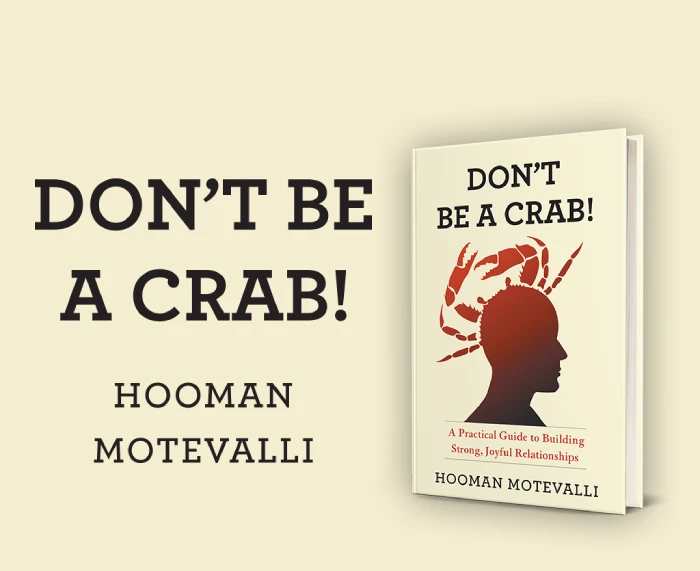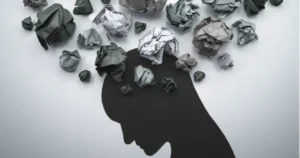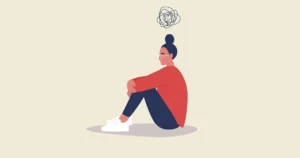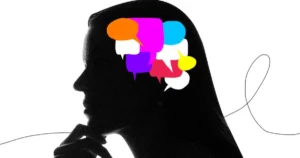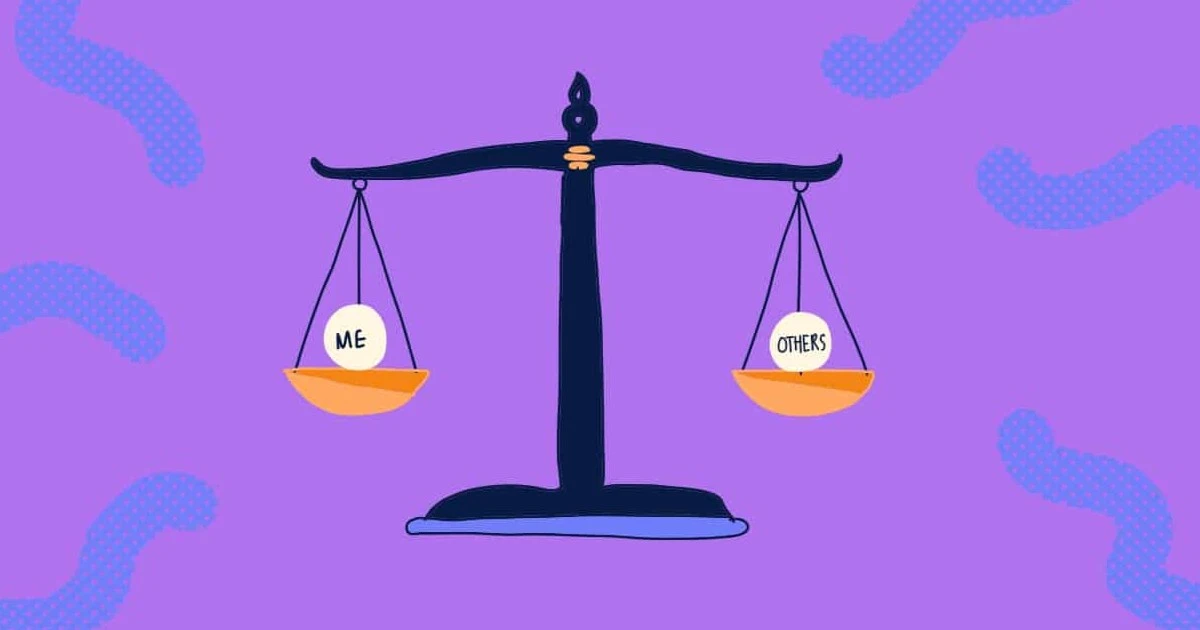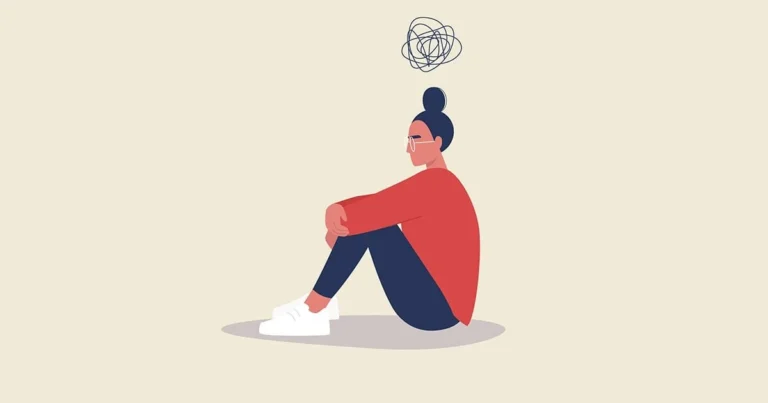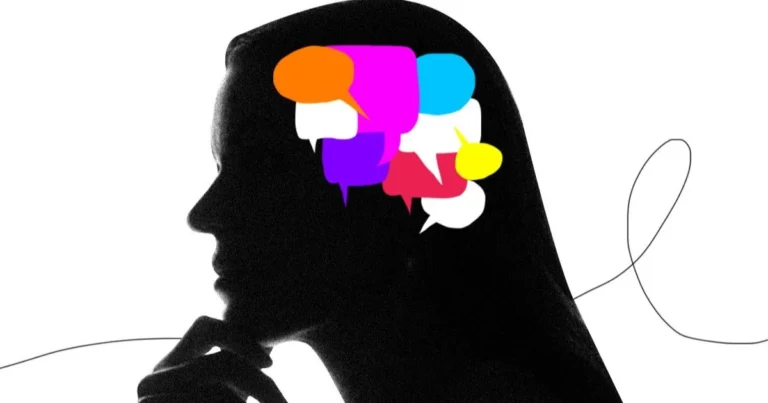We never thought that social media would change the way we see ourselves and other people. When we open our phones, we see pictures of people who are doing great and hear stories of people who have done well, which makes us question our own path. We’ve been looking at what other people are doing for ages to see where we stand, so it’s very natural.
But now? Things are going crazy. We look at edited selfies, dream trips, and job openings all the time and ask ourselves, “Am I falling behind?” The truth is that we’ve all shared our best moments but kept our problems to ourselves. We get confused, lose confidence, and sometimes forget what’s important to us when we compare ourselves to others all the time.
What Are The Dangers of Comparison?
We mess up our minds a lot more than we think. This is especially true now that social media shows us perfectly filtered versions of everyone’s life all the time. Now is the time to see all the dangers threatening you when you compare yourself to others:
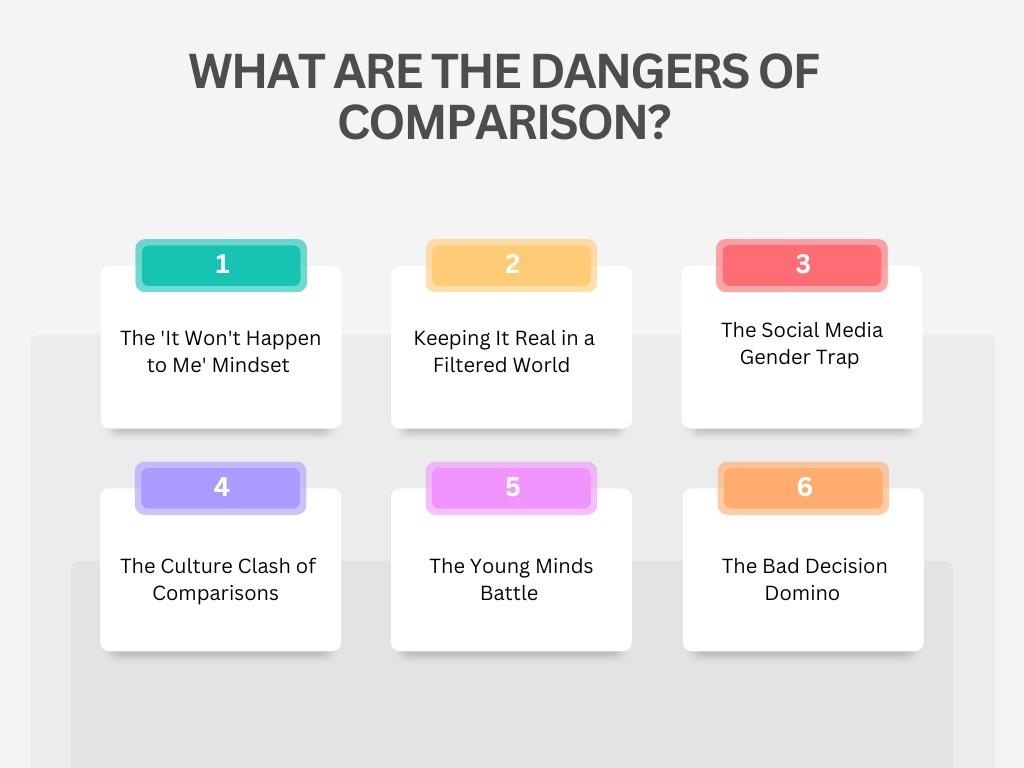
The ‘It Won’t Happen to Me’ Mindset
Have you ever heard about someone else’s bad luck and thought, “No way that could happen to me?” That thought is based on real science, though. The University of Illinois’s Dr. Linda Perloff looked into this a lot and found something pretty strange: We avoid risks by comparing ourselves to people we think are in worse shape.
It’s funny how when we see someone else having a hard time, we think we won’t have any problems ourselves. What’s worse is that this way of thinking can put us in danger. It’s more likely for us to get into trouble when we think we’re bulletproof. This is because we might skip important safety steps or ignore warning signs.
Keeping It Real in a Filtered World
Honestly, we all play different parts online. The things that Dr Claudia Holonics said about how we act on social media are very true, and they hit close to home. We each have a different mindset for Instagram, LinkedIn, and maybe even TikTok.
As they say, “Fake it ’til you make it.” This is a perfect example of putting your best foot forward. Unfortunately, we lose touch with who we really are when we’re busy managing all these different versions of ourselves, showing only the highlight reel and hiding the mistake reel.
The Social Media Gender Trap
Rich’s newest study shows that men and women are getting caught in very different social media loops. Women are stuck in the “transformation Tuesday” loop while guys are showing off their new bodies.
Surprisingly, it’s not just feeling bad when you see these posts. Society’s use of technology and social media is changing the way we think our bodies should look and move. It’s similar to being trapped in a maze of funhouse mirrors where each reflection tells you that you’re not good enough, but in various ways, depending on your gender!
The Culture Clash of Comparisons
Li and the team (2022) blew the lid off on how people from different countries compare things. See this? They discovered that Chinese and American people rate themselves against others in very different ways.
It’s like everyone is playing the same game but following different rules! Some societies are all about standing out, while others prefer to fit in. What’s the risk? If you look at where you grew up, you’ll notice that these comparison traps affect you in different ways. What a mess of different cultures!
The Young Minds Battle
It’s interesting what Li and his team found in 2022 about how age changes how we relate ourselves to others. When you’re young and trying to figure out who you are, you’re like a sponge that soaks up all the comparisons you see.
What makes this dangerous? Every “they’re better than me” moment is twice as painful when you’re trying to figure out who you are. If you’re a beginner player and you keep comparing yourself to the pros, you can lose all confidence before you even start!
The Bad Decision Domino
Kulesza (2023) found it very interesting that comparing ourselves to others makes us make bad decisions. You might wonder why we don’t ask, “Is this right for ME?” but instead “What is everyone else doing?”
What’s the risk? In the end, we make decisions that are bad for us but great for other people. For example, when you choose a job because your friends do it instead of because you really want to do it. When we compare things, we can end up in situations that seem good on paper but are really bad for us.
How Comparing Yourself to Others Messes With Your Head?
We live in a time when comparing ourselves to others is something we do every day. Not only is this comparison game tiring, but it’s also affecting our happiness in ways we don’t understand.
- The Not So Quiet Addiction: Comparing things gets you hooked in the same way that other drugs do. You’re making it harder to break the habit every time you look at someone’s perfect Instagram post or LinkedIn brag. It’s the digital version of “Death by a Thousand Scrolls.”
- The Vampire of Energy: You’re losing valuable mental energy when you’re too busy thinking about other people. Being worried about how you compare all the time is like having a program running all the time, which drains your energy.
- The Identity Thief: Comparison takes your real self away slowly. You get caught up in someone else’s highlight reel instead of going your own way. It doesn’t take long before your goals aren’t even your own. For practical guidance on breaking free from this cycle and embracing your unique journey, explore the self-development strategies in Don’t Be a Crab book. Grab your copy today to start building a life driven by your own values and aspirations.
- The Killer of Success: Comparison is the worst thing that can happen after a big win. It’s not as cool to get that raise when you see that someone younger got it before you. Your victories start to seem hollow because there’s always someone who appears to be doing it better.
- The Friendship Killer: Comparison uses friends as measures of how well you’re doing. Every catch-up turns into a small battle, and real relationships get lost in the rush to see who’s ahead in life.
How Comparison Poisons Your Relationships?
We all look at those posts about #perfectcouplegoals and wonder why our own relationship doesn’t look like that. The problem is that this never-ending game of comparison is hurting our relationships more than we know.
- The Battle Between Public and Private: Sauter’s study shows that we share private times on social media. It’s more about the Instagram post than the talk at that lovely dinner. We forget to live our relationship because we’re too busy writing about it.
- The Endpoint Blocker: You miss the way your partner makes your coffee just the way you like it when you’re busy looking at how your friend’s partner surprises them with flowers every week. These things keep you from making bridges when you should be doing the opposite.
- The Breach of Trust: When you constantly compare your relationship to others, worry starts to grow. If your partner really loves you, they would repair your vehicle or remember your mom’s birthday. But you’d be too busy worrying about why they don’t post about you more often compared to other couples.
- The Conversation Stopper: It’s hard to have real conversations when you compare your connection to others. You don’t tell your partner how you really feel because other couples seem to handle things so well. Spoiler alert: they don’t.
- The Source of Hatred: Every time you compare something, it makes you more frustrated. You start to notice that your partner doesn’t like what you see online, and you forget that social media only shows one side of the story.
- The Joy Stealer: Seeing other people’s love stories takes away from the joy of your own. You’re not looking forward to a nice night in because you saw pictures of your friend’s extravagant date night.
How to Stop Comparing Ourselves to Others?
We don’t have to ignore other people’s successes in order to break this habit. Instead, we need to focus on our own unique path and set personal standards that are in line with our values and goals.
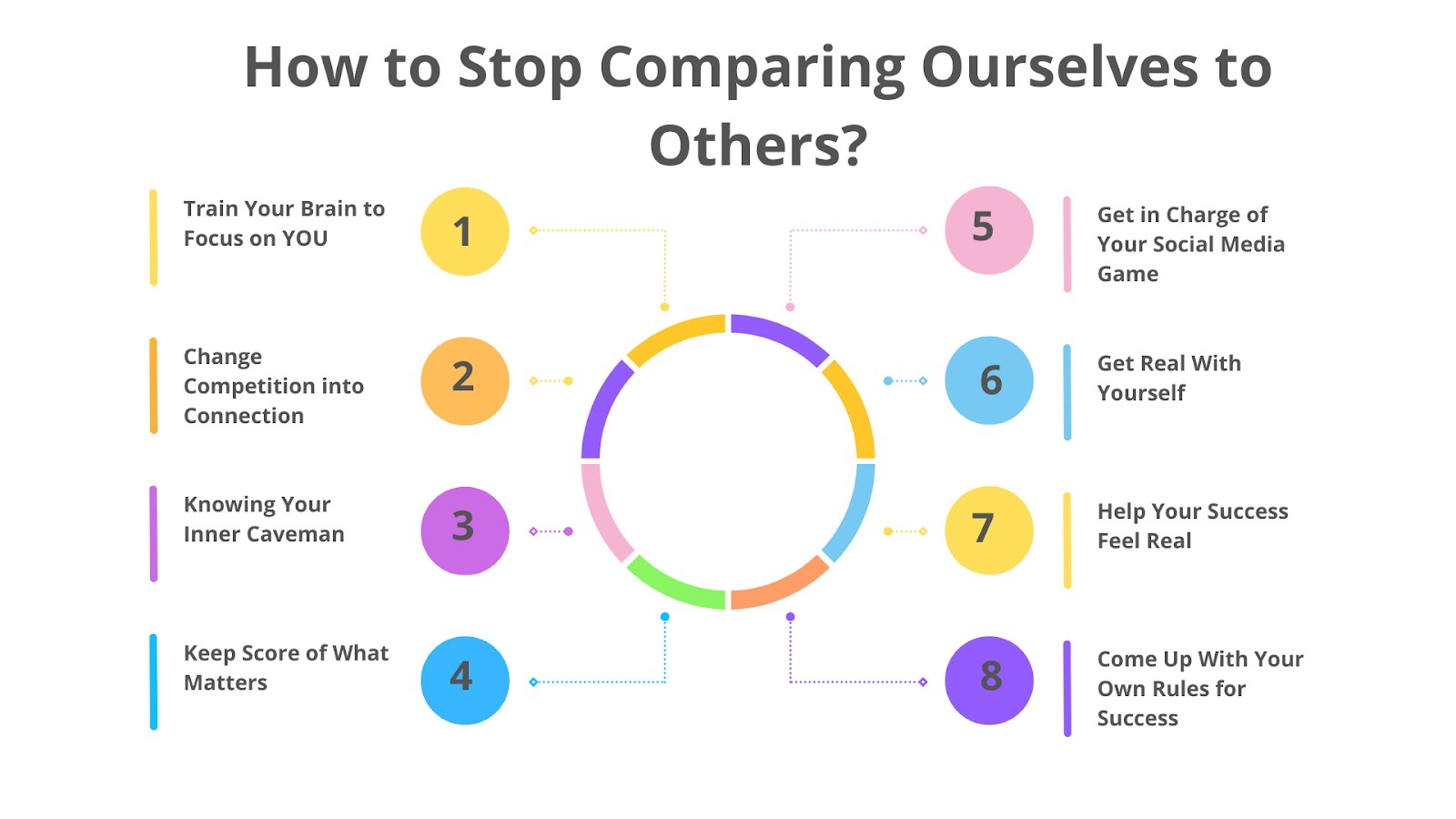
Train Your Brain to Focus on YOU
The cool thing that Golubickis and Macrae found is that you can train your brain to stop comparing yourself to other people. It’s just a habit, and you can break it. Their study shows that you get better at stopping those automatic thoughts of comparison when you spend time on your own path and progress. To dive deeper into mastering your mindset and overcoming these mental traps, explore Confusion To Clarity: How To Control Your Thoughts And Take Charge Of Your Life.
This is like building mental strength that will help you stay in your own lane. This is a muscle that becomes stronger the more you practice focusing on your own trip.
Change Competition into Connection
“Don’t Be a Crab!” has some very wise words about changing the meaning of comparisons. Don’t see someone else’s success as a threat to your own. Instead, be happy for them.
Something amazing happens when you stop being the person who always keeps score and starts cheering other people on. Instead of competing, you start making relationships.
The best part? When you lift others up, you stop comparing yourself to others all the time, which can be very tiring.
Knowing Your Inner Caveman
Gilbert and Price’s study shows that comparing things is actually part of our natural desire to stay alive. In the past, comparing yourself to others was a way to check if you had enough food or were safe from danger.
Anyway, we’re not living in caves anymore, so we can pick and choose when to listen to this old stuff. Your brain only works on an outmoded survival program; once you know this, you’ll be able to stop thinking about comparisons.
Keep Score of What Matters
It’s time to become the biggest fan of your own success story! Bring a notebook with you and write down three wins every day. Yes, even small things count.
Made your shake in the morning? Get it. Crushed that talk for work? Two wins. Did you finally mend that creaking door? That’s a win for sure!
This isn’t just taking notes for no reason; it’s a brain workout to train you to see your own great moments instead of all the other people’s. “Count your own gifts, not someone else’s,” as the saying goes.
Get in Charge of Your Social Media Game
Let’s talk about how you really feel about social media. Pick two 15-minute times during the day to check your apps, and don’t skip them.
Deal with it: ignore anything that makes you feel “less than” with all your might. Your feed should make you feel good, not bad. Put the comparison triggers out of your digital life and bring in the material that actually makes your day better.
Do not forget the saying, “You can’t compare your behind-the-scenes to their feature reel.”
Get Real With Yourself
Stop and ask yourself, “What’s my idea of awesome?” when you feel like comparing yourself to others. Different people may have different ideas of what it means to “crush it.”
For some, it means having time for both work and art. There isn’t just one way to be successful, so write down what makes you happy instead of what everyone else is after.
In other words, “run your own race.” The unique thing about your road is that it is only yours.
Help Your Success Feel Real
Now is the time to really enjoy your wins! Make your own list of ways to celebrate. For example, text your best friend when you hit the gym five days in a row or buy yourself a nice coffee when you do a great job on a presentation.
These aren’t just random awards; they’re personal high-fives that help you feel like you’ve really done well. You are telling yourself, “My wins matter, no matter what anyone else does,” when you party in your own way.
Come Up With Your Own Rules for Success
Hart’s study taught us a very important lesson: Stop comparing yourself to others and start judging yourself. Make your own scoreboard instead of looking at what other people are crushing.
Do you want to learn Spanish? Maybe mastering one new phrase every day is more important than becoming skilled in one month. Starting a business?
Pay attention to your steady progress instead of someone else’s huge success story. Remember that “your first chapter is not equal to another person’s twenty-first.”
Beyond Compare: The Art of Being Uniquely You
It’s very clear from the study that comparing ourselves to others all the time is making our minds messier than ever. We forget who we are because of social media, which makes us think we have to always “keep up with the Joneses.”
One bright spot, though, is that studies conducted by industry heavyweights Perloff and Holonics reveal an approach that avoids falling into this comparison trap. Their work and the useful advice in “Don’t Be A Crab!” give us strong ways to break free.
We can focus on our own path, change competition into teamwork, figure out why our brains play these comparison games, and choose based on what’s important to us instead of what everyone else is doing.

